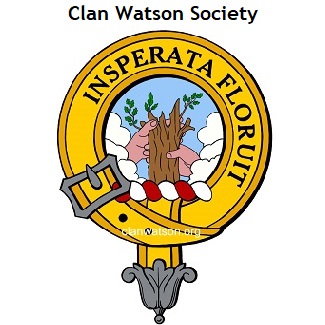Contact Information
Website:
Membership:
Shane Watson
NOC Tower
Doha, State of Qatar
PO Box 21264
Delegate to Scots of Canada:
Shane Watson
NOC Tower
Doha, State of Qatar
PO Box 21264
https://www.facebook.com/groups/clanwatson/
Instagram : @clan_watson
CREST: : Two hands holding the trunk of one oak tree sprouting out fresh branches, the hands issuing out of clouds all proper
MOTTO: Insperata Floruit (Flourished Unexpectedly)
Name Variants: MacBhaididh, MacQuat, MacQuattie, MacQuhat, MacQwat, MacRowatt, MacUait, MacWalter, MacWater, MacWatson, MacWatt, MacWatters, MacWattie, Vatsoun, Walter, Walterson, Wasson, Waters, Waterson, Watson, Watsone, Watsoun, Watt, Wattie, Wattson
Tartans
Modern

Ancient

Weathered

A Short History
It is unknown exactly when the name Watson was introduced to Scotland, but we start to see it in records dating back to the 14th century. The name is derived from Wat, the diminutive form of Walter, an Old German name meaning “mighty warrior” or “ruler of the army”. Two potential routes by which the name Walter entered the British Isles are either with Normans in the form of Gaultier or with Dutch of Flemish traders in the form of Walter or Wouter.
In old times, the name appears to have been primarily concentrated around the south east of Scotland and the north east of England. Although not a clan in the traditional highland sense, the Watsons are legally recognised by the Court of the Lord Lyon as an armigerous clan, with the last registered chief being James Watson of Saughton, whose arms were matriculated in 1818. We also have a contemporary account from 1794 stating that his father, Charles Watson of Saughton, was chief of the name in Scotland, although to date we have been unable to locate any records to validate this. James’s last surviving heir, his daughter Helen, married the Lord Aberdour, a member of the Douglas family who became the 18th Earl of Morton. The Douglas have expressed that they are not interested in taking up the title of Chief of Clan Watson and so the chiefship currently lies dormant while the society searches for other hereditary heirs.
Clusters of prominent Watsons are found in several key cities in Scotland from the early to mid-16th century onwards. They are nearly all successful merchants and many of them held civic positions such as bailies and provosts. We are aware of links between some of these clusters – for example, the Watsons of Damhead and Muirhouse were descended from the Watsons of Saughton – and see hints that other clusters were also connected to the Saughtons. Our current working assumption is that the Watsons built a reasonably successful trading and political empire that spread to key cities in Scotland, to London, and as far afield as the Caribbean as the British Empire expanded.
It is considered improbable that the Watson chiefs had a sizeable clan, even though they were recognised as chief of the Watson name in Scotland. Y-DNA evidence confirms our assumption that, as a patronymic name, the name Watson arose independently in multiple locations across Scotland and England.
The Watsons are considered to be septs of both Clan Buchanan and Clan Forbes. The link to the Buchanans is likely due to a cadet branch of the Buchanans of Leny that became known as the MacWatties, although we do find evidence of prominent Watsons and Buchanans mixing in the same circles in Dunbartonshire. Many folk of the name Watt lived in and around the ancient lands of the Forbeses in Aberdeenshire, which is a possible root of the association of the Watson name with that of Forbes.
The current Clan Watson Society is a somewhat informal initiative that commenced in 2004 with the aim of building links between Watsons (and name variants) across the world to enable collaborative research and knowledge sharing and to develop a sense of community. We welcome all those who were born or married into any of the name variants, or anyone with an interest in our research to sign up on the website or our Facebook group or to follow us on Instagram. We now have several hundred members across the world and are currently seeing rapid growth and are now in the process of formalising the society.
